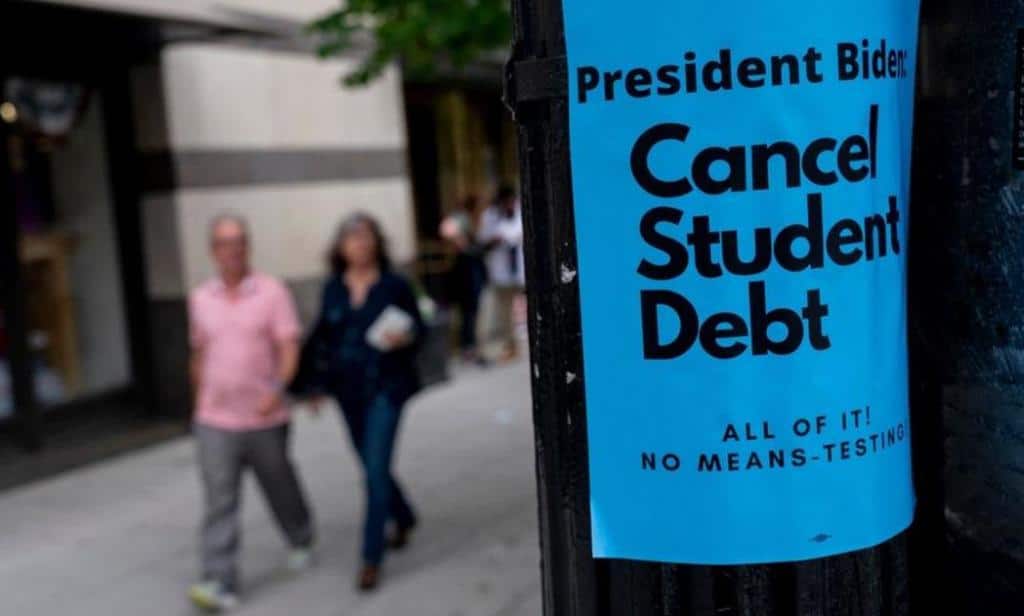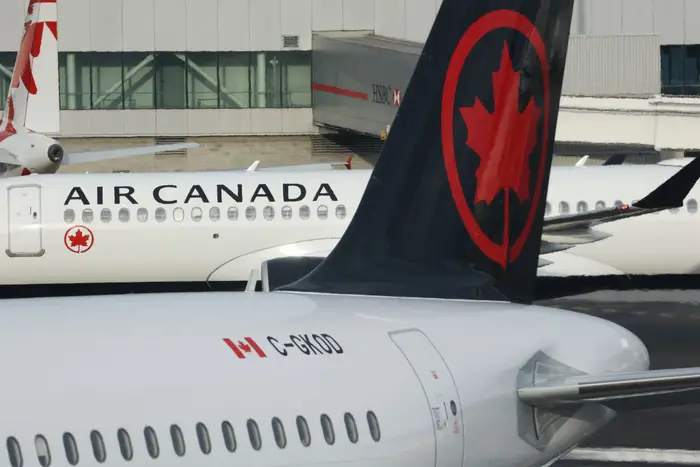News
Federal Judge Axes Biden’s Student Loan Debt Relief Plan

A federal judge in Texas ruled on Thursday that President Joe Biden’s plan to cancel hundreds of billions of dollars in student loan debt was illegal and must be vacated, handing conservative opponents of the program a victory.
As he ruled in favour of two borrowers backed by a conservative advocacy group, U.S. District Judge Mark Pittman, an appointee of former Republican President Donald Trump in Fort Worth, called the program an “unconstitutional exercise of Congress’s legislative power.”
Reuters reported that Biden’s White House did not respond immediately.
The debt relief plan was already temporarily halted by the 8th U.S. Circuit Court of Appeals in St. Louis while it considered a request by six Republican-led states to enjoin it while they appealed the dismissal of their own lawsuit.
The ruling came in response to a lawsuit filed by two borrowers who were either partially or completely ineligible for the loan forgiveness plan proposed by Biden.
The plaintiffs claimed it was illegal because it did not follow proper rulemaking procedures.
The Job Creators Network Foundation, a conservative advocacy group, founded by Bernie Marcus, a co-founder of Home Depot, backed the borrowers (HD.N).
Several lawsuits have been filed against Biden’s plan by conservative state attorneys general and legal groups, but plaintiffs had struggled to convince courts that they were harmed in such a way that they had standing to sue before Thursday.
The plan, announced in August, calls for borrowers earning less than $125,000 per year, or $250,000 for married couples, to have up to $10,000 in student loan debt forgiven.
Borrowers who received Pell Grants for low-income college students will have up to $20,000 in debt forgiven.
In September, the nonpartisan Congressional Budget Office estimated that debt forgiveness would eliminate approximately $430 billion of the $1.6 trillion in outstanding student debt, with over 40 million people eligible to benefit.
Pittman stated in his 26-page ruling that whether or not Biden’s plan was good public policy was irrelevant because the program was “one of the largest exercises of legislative power without congressional authority in the history of the United States.”
Pittman claimed that the HEROES Act, which provided loan assistance to military personnel and was used by the Biden administration to pass the relief plan, did not authorize the $400 billion student loan forgiveness program.
“We are not ruled in this country by an all-powerful executive wielding a pen and a phone,” Pittman wrote. “Instead, we are governed by a Constitution that establishes three distinct and autonomous branches of government.”
The ruling, according to Elaine Parker, president of the Job Creators Network Foundation, “protects the rule of law, which requires all Americans to have their voices heard by their federal government.”
News
Canada’s Trans Mountain Pipeline Starts Operations After 12 Years and $25 Billion

After 12 years and C$34 billion ($25 billion), Canada’s Trans Mountain pipeline expansion project (TMX) began commercial operations on Wednesday, a major milestone expected to transform access to global markets for the country’s producers.
Pipeline constraints have forced Canadian oil producers to sell oil at a discount for many years, but TMX will nearly triple the flow of crude from landlocked Alberta to Canada’s Pacific coast to 890,000 barrels per day (bpd).
For Canada, the world’s fourth-biggest oil producer, the additional pipeline capacity is set to boost crude prices, lift national gross domestic product and expand access to Asian oil markets.
Both TMX and the existing pipeline are now able to transport crude oil and the company has the ability to load cargoes from all three berths, Trans Mountain said in a press release, adding that 70% of the expanded pipeline is full by volume.
“Everyone has been waiting for this for literally years,” said Rory Johnston, founder of the Commodity Context newsletter. “It’s a fantastic thing for Canada and the Alberta oil patch.”
The expanded pipeline was first proposed by Kinder Morgan in 2012. The Canadian government bought it in 2018 to ensure the project got built despite opposition, but construction has been marred by regulatory delays and costs soaring to more than four times the project’s original budget.
“It is increasingly difficult to build pipelines in this country and it wouldn’t surprise me if this was the last pipeline,” Jon McKenzie, CEO of oil, said on an earnings call. The Canada Energy Regulator (CER) granted the final permits for the expansion project on Tuesday, clearing the way for the pipeline to start operating.
Trans Mountain Pipeline will boost Canada’s oil export capacity
Trans Mountain Corp said May 1 marks the commercial commencement date for the project, and tankers will be able to load at Westridge Marine Terminal in the Port of Vancouver by mid-May.
TMX will substantially boost Canada’s oil export capacity and could help shrink the discount on benchmark Canadian heavy crude, currently around $13.50 a barrel below U.S. crude, to less than $10 a barrel, analysts at RBC Capital Markets said in a note to clients.
Asian buyers are already showing interest.Reliance Industries bought 2 million barrels of Canadian crude from Shell for July delivery, marking the Indian refiner’s first oil purchase from TMX, Reuters reported.
For Ottawa, the project’s completion comes as a relief. Prime Minister Justin Trudeau’s Liberal government was slammed by environmental campaigners for buying the pipeline in the first place, and has drawn sharp criticism during construction for spiralling costs.
Green groups worry about the pipeline’s potential to leak in pristine areas and its expansion of carbon-intensive oil sands crude. Climate activists warn increasing oil and gas production risks hamstringing Canada’s efforts to cut carbon emissions.
“Trudeau made the decision to purchase this gift for the fossil fuel industry, but it’s these communities and ecosystems that will pay the price when the Trans Mountain pipeline inevitably spills,” said Peter McCartney, climate campaigner at the Wilderness Committee environmental group.
Canadian oil production
The federal government wants to sell at least part of Trans Mountain to Indigenous groups, but is expected to have to take a major haircut on its investment.
“The Trans Mountain Expansion Project will ensure Canada receives fair market value for our resources while maintaining the highest environmental standards,” said Katherine Cuplinskas, press secretary to Deputy Prime Minister Chrystia Freeland.
“The federal government will launch a divestment process in due course.”
Canadian oil production is forecast to hit a record high of around 5.3 million bpd this year, according to TD Securities, as producers ramp up output in anticipation of TMX’s new capacity.
Two traders in Calgary said oil inventories in Alberta are brimming at record levels of 42 million barrels, but expected to draw down reasonably quickly once the expanded pipeline starts flowing.
“The completion of TMX is monumental for Alberta, since this will significantly increase our province’s output,” Alberta premier Danielle Smith said in a statement on Tuesday.
Conservative premier Smith is a frequent critic of Trudeau’s Liberals but thanked the federal government for seeing the project through, and said stronger Canadian crude prices would result in many millions of dollars extra in government revenues.
Source: Reuters
News
Air Canada Forced to Apologizes Over Insulting First Nations Chiefs Cultural Heritage

Air Canada has had to apologise to an first nations chief after cabin workers attempted to remove her sacred headgear and place it in the cargo hold of a domestic flight last week.
Cindy Woodhouse Nepinak, the newly elected National Chief of the Assembly of First Nations, said she was “stunned” when crew members attempted to steal the sacred item from her on a flight between Montreal and Fredericton, throwing the case in which she was carrying the headdress into the hold.
“I was kind of stunned,” she told CBC News on Friday, explaining that her people view a headdress as “like your child, like your baby.” It is with you. “It is a part of you.”
The leader stated that she had previously traveled without incident, carrying the headgear in a dedicated case alongside her carry-on luggage, but this time the personnel took a different approach.
She told the outlet that the scenario became “pretty heated,” with workers removing the case from her after she requested to keep it under the seat in front of her.
Woodhouse Nepinak then removed the precious artifact from the case and carried it on her lap throughout the journey, but the crew insisted on putting the case in the hold and placing it in “garbage bags”.
Staff did not return the case to her at the end of the flight, and the captain reportedly had to intercede, despite the fact that fellow passengers treated her with great respect.
“There were Canadians from all walks of life sitting in the plane who were astounded, which I was delighted to see, because it wasn’t like people simply sat there and were quiet. “People were genuinely trying to help,” Woodhouse Nepinak said.
“I want to focus on making sure that First Nations can come through our airport and our airlines, all airlines, Air Canada included, in a safe way, in a respectful way.”
Canadian Prime Minister Justin Trudeau criticized Air Canada, calling the situation “unacceptable”.
“From my perspective, that is an unfortunate situation that I hope is going to lead to a bit of learning, not just by Air Canada, but a lot of different institutions,” the prime minister told reporters on Friday.
The Assembly of Manitoba Chiefs denounced the Air Canada crew’s actions and asked for extensive cultural sensitivity training throughout the airline sector.
“Systemic discrimination reveals itself in situations like this,” AMC Grand Chief Cathy Merrick stated in a statement.
“When our precious goods are treated as if they were mere objects. What happened to National Chief Woodhouse Nepinak is a horrible example of how ignorant Canadians are regarding First Nations’ treasured cultural goods and traditions.
Other tribe chiefs presented Woodhouse Nepinak with the headdress during a “headdress transfer” ceremony in January of this year, which is considered one of the highest accolades within First Nations.

National Chief of the Assembly of First Nations Cindy Woodhouse Nepinak: CBC Image
AMC stated that by 2024, with knowledge freely available online, more people should comprehend these customs and beliefs, and Woodhouse Nepinak agreed.
“This can… set the motion in place for, you know, the airlines, Air Canada, WestJet, whomever, to have a, you know, an understanding of our way of life, our beliefs, and have that mutual respect,” she said in an interview with CBC.
On Thursday, Air Canada apologized, saying it will communicate with the leader to better understand the issue.
“Air Canada understands the importance of accommodating customers with items and symbols of sacred cultural significance, and in the past the chiefs have been able to travel while transporting their headdresses in the cabin,” the company said in a statement to CBC News.
Air Canada stated that the “regrettable incident” will prompt a review of company rules.
Air Canada Resumes Directs Flights from Vancouver to Thailand
Air Canada Resumes Directs Flights from Vancouver to Thailand
World
Phones, Islamic Books And Currency Exchange. Some Businesses Are Making Money Out Of Taliban Rule

KABUL, Afghanistan Taliban – Yunis Safi, a Kabul businessman, understands how important it is to show off your phone if you want something done.
“In Afghanistan, your phone is your personality,” he remarked, beaming, his hands adorned with jewel-encrusted rings. One has an emerald, the other a large Russian diamond. “When you go to a meeting with the government, the better your phone, the more they respect you.”
Safi owns a phone business in the exclusive Shar-e-Naw area. An armed guard stands outside. The iPhone 15 Pro Max is now on store shelves, priced at $1,400. He has customers willing to part with this amount of money, which may surprise some, considering the country’s economic troubles and that more than half of the population relies on humanitarian help for survival.
Afghanistan’s finances were precarious even before the Taliban took power in 2021. The budget relied significantly on foreign help, and corruption was rampant. The seizure shattered Afghanistan’s economy, freezing billions of dollars in international finances and forcing tens of thousands of highly skilled Afghans to flee the country with their money.
AP – VOR News Image
Phones, Islamic Books And Currency Exchange. Some Businesses Are Making Money Out Of Taliban Rule
Despite the terrible conditions, some businesses benefit under the Taliban administration. Women are relegated to customers, however, because authorities have forbidden them from most jobs, including retail. None of Safi’s 78 employees are female.
He has tapped into a varied client base, including those eager for the latest iPhone release and those who prefer simple devices. The latter account for the majority of his sales and range in price from $20 to $200.
The Taliban used to target phone towers and threaten telecom companies, accusing them of working with the United States and other international forces to detect insurgent movements via mobile phone signals. Now, they’re investing in 4G mobile networks.
The Communications Ministry reports that 2 million new SIM cards have been issued in the last two years, and subscriber numbers are increasing. Enayatullah Alokozai, a ministry official, stated that the government is investing $100 million in telecom and has completely rebuilt hundreds of towers.
There are 22.7 million active SIM cards in a country with a population of 41 million. Ten million are for phone calls, with the remainder for mobile internet.
According to Trade Ministry estimates, phone imports have increased. More than 1,584 tons of phones entered Afghanistan in 2022. Last year, it weighed 1,895 tons.
Safi said he had many Taliban customers, and the younger ones prefer iPhones. “Of course, they need smartphones. They use social media and enjoy making videos. The iPhone offers stronger security than Samsung. The camera’s resolution, CPU, and memory are all improved. Afghans use smartphones like everyone else.”
Safi has the iPhone 15 Pro Max, an Apple Watch Ultra, and three automobiles.
Business was difficult shortly after the Taliban took power, but it is improving, according to Safi. “The people buying the new release iPhones are the ones with relatives abroad sending money to Afghanistan.”
AP – VOR News Image
Phones, Islamic Books And Currency Exchange. Some Businesses Are Making Money Out Of Taliban Rule
Remittances are a lifeline, but less than half of what they were before the Taliban took power and the financial system collapsed.
At Kabul’s rowdy Shahzada Market, hundreds of money changers clutch stacks of the local currency, the Afghani, and noisily hawk their wares. They occupy every floor, stairwell, corner, and cranny.
According to Abdul Rahman Zirak, a senior official at the money exchange market, $10 million changes hands every day. The diaspora sends largely U.S. cash to family, which they convert for Afghani.
Before the Taliban took control, there were more ways to donate money to Afghanistan. However, there are no longer any linkages to SWIFT or international banking, which is one of the main reasons why business is brisk in the market, he said.
“The work of money exchangers has increased and strengthened,” he stated. “Money transfers come from Canada, the U.S., Europe, Australia, Arab nations and other neighboring countries.”
Trade becomes extremely chaotic during the holidays. During the holy month of Ramadan, 20,000 people visited the market daily, and it took more than 90 minutes to enter, he claimed.
Our business may suffer if the restrictions are lifted and the assets are unfrozen. But I don’t see this happening. Many do not have bank accounts. Unemployment is rising, therefore people send money to Afghanistan. Our company will be needed for years to come.”
Irfanullah Arif, who owns Haqqani Books, a specialist retailer of Islamic manuscripts, is likewise pleased with his fortunes. His consumers are primarily religious school professors and pupils.
There are at least 20,000 madrasas in Afghanistan. The Taliban intends to build more. Last year, the supreme commander allegedly directed the recruiting of 100,000 madrassa teachers.
AP – VOR News Image
Phones, Islamic Books And Currency Exchange. Some Businesses Are Making Money Out Of Taliban Rule
While Arif’s business suffered, along with everyone else’s, from the chaos that followed the takeover, there was another cause. “All the students left the madrassas and went to work for the (Taliban) government,” Arif claimed.
Success, however, comes with a price. Arif imports everything, and the Taliban are just concerned with collecting revenue, even from Islamic literature.
Arif pays a tax of 170 Afghanis ($2.36) for a carton of 100 books, with a shipping cost of 500 Afghanis ($6.95). His bookstore’s taxes have increased under the Taliban administration.
“That’s why books are expensive in Afghanistan,” he sighed. “With the increase of madrassas, our trade has gone up, but so have the taxes.”
SOURCE – (AP)
-
Entertainment5 months ago
Robert Downey Jr. Won’t Be Returning To The Marvel Cinematic Universe As Tony Stark
-
Politics5 months ago
Unveiling the Power and Influence of The Conservative Treehouse
-
Sports4 months ago
Saints’ Aggressive Play-Calling Ends Up Coming Back To Hurt Them In Loss To Rams
-
Celebrity5 months ago
Norman Lear, Producer Of TV’s ‘All In The Family’ And Influential Liberal Advocate, Has Died At 101
-
Innovation5 months ago
Sony Debuts First PS5 Controller For Disabled Gamers
-
Business4 months ago
Nike Says It Will Cut $2 Billion In Costs In A Major Warning For Consumers



















































